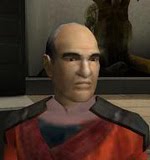This restates some of the points that I made in my initial response to Ginia Bellafante's New York Times "Game of Thrones" review on Friday, but it is directed at Ms. Bellafante and emphasizes criticisms that she failed to address in her recent response.
I admit that we--the George R. R. Martin fans, the female lovers of fantasy, the geek community, etc.--were so offended by your review of "Game of Thrones" that in many cases we allowed our fury to cloud our judgment in writing respectable responses. I myself got worked up about your estimation that the cost of "Game of Thrones" could take "Mad Men" to the second term of a Malia Obama presidency, when my own calculation put the "Game of Thrones" cost at only about three seasons of "Mad Men." Your hyperbole was clearly not intended to be a factual statement, however, so I should have just let it go. Furthermore, it must have seemed odd to you that so many people who hadn't even watched the show yet could disagree so vehemently with your review. We didn't even now what we were talking about, right? Still, I believe some of our complaints about the review were legitimate, and they were the ones largely ignored in your recent response.
Your review implied that the sex in the show was the only likely draw for a female audience, because "Game of Thrones" is "boy fiction." First of all, the assumption that women watch shows for the sex seemed odd to me. Now maybe this is because I don't know any women who watch "Sex in the City," but I always thought that sex was added to TV and movies to attract men. Statistics might prove me wrong, but the generalization still seemed to come out of nowhere. More importantly, by calling the show "boy fiction," you either dismissed as insignificant all female fans of A Game of Thrones (though you recognized that we must exist), or you implied that our tastes are contrary to our sex. True, none but a privileged few of us had actually seen the pilot before Sunday, but when a TV series is based on books, it is not unreasonable to assume that the content will be similar, and thus that the show will attract a similar audience. The problem was that you offered no reasons to support your claim that the show was "boy fiction." Were the female characters one dimensional, weak, or boring? Are all the smart, reasonable, heroic characters men? Was most of the drama between males to whom you couldn't relate? Any reason explaining your accusation could have helped us to understand why you thought the show was unsuitable to feminine sensibilities and might have caused us to reserve judgment until we had seen the show ourselves. Instead you offered no such explanation, leaving us to believe that what little you did talk about--the show's complexity, created language, and medieval fantasy setting--somehow made the show unsuitable for females. This is what female fantasy fans, who love complexity, created languages, and medieval fantasy settings, found offensive.
I'm a nobody, you're a New York Times TV critic, so I can't tell you how to write a review. Still, in this case a discussion of the actual content of the show, including plot and characters, could have helped to prevent some of the controversy surrounding your review. Yes, there are a lot of characters and the plot is complicated, but that is no excuse to talk only about the production, the weather, and the sex. As a reviewer, you are entitled to your opinion. But since you can only speak for yourself, as you recognize, it would be useful if your reviews included enough information to guide readers toward their own evaluations. Your recent review of CBS's "Chaos," for example, described the plot, characters, humor, and action well enough to help a reader decide whether or not to give the show a chance. It's a shame you didn't give "Game of Thrones" such reasonable treatment.
Subscribe to:
Post Comments (Atom)
















2 comments:
I wholeheartedly agree with you. Yes, at first I was really riled up at her statements but after cooling off, I realized that she is entitled to her opinion. However, like you said, if she had taken the time to support her arguments, maybe the fan girl world wouldn't have been so upset in the first place.
Yes, by not explaining why it was "boy fiction," it seemed that she assumed it was obvious why she thought it was. And that was what was offensive.
Post a Comment